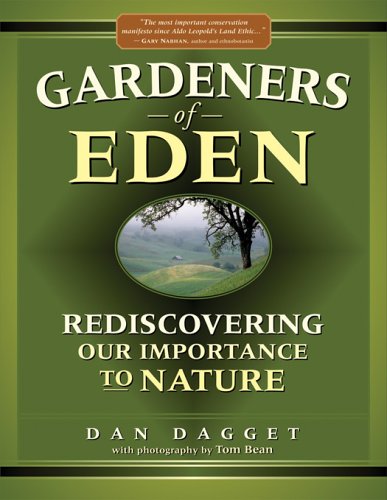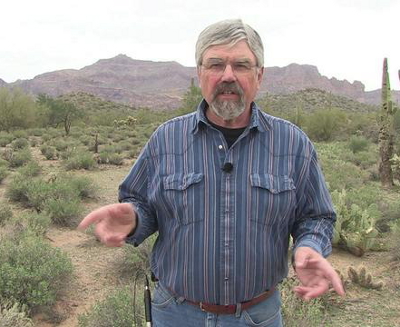
Gardeners of Eden
 I've been slowly digesting
Gardeners
of Eden, by Dan
Dagget, for the last month or so. Usually, I know what I
think of a book right away, but Gardeners of Eden both inspires me and repels me, making it hard to write a
review. As usual, I'll start with the good parts.
I've been slowly digesting
Gardeners
of Eden, by Dan
Dagget, for the last month or so. Usually, I know what I
think of a book right away, but Gardeners of Eden both inspires me and repels me, making it hard to write a
review. As usual, I'll start with the good parts.
Those of you who have
studied natural resource management have probably heard about the
great divide between preservationists and restorationists.
Preservationists believe that the best thing we can do to any wild
area is to leave it alone, preserving it in its natural
state. Restorationists, on the other hand, believe that we
should actively work to improve problems in the natural world
(perhaps by carrying out prescribed burns, grazing, or timber
cuts). The philosophy of preservationism is found in the
management of most National Parks in the U.S., while
restorationists hold sway over the National Forests.
Dan Dagget started
out as a preservationist (just like I did), and was an
environmental activist in groups including EarthFirst! for
decades. However, over time, he started seeing nearby
ranchers in the West who were producing healthier ecosystems than
were found in neighboring leave-it-alone preserves. Dagget
researched pre-Settlement human impacts on these landscapes and
realized that the land had evolved to depend on a partnership with
humanity. Rare onions and mussels and fishes and birds all
seemed to expand their numbers in areas with thoughtful human
impact, and Dagget concluded we were doing our ecosystems a
disservice by acting like aliens intent only on protecting the
landscape from our own depredations.
 While inspiring from
a permaculture perspective (don't we all want to believe we can
create forest gardens and pastures that will improve the natural
world while feeding us?), I kept finding flaws in Dagget's
logic. For example, Native Americans weren't evenly
scattered across the continent, so doesn't it stand to reason that
certain areas have evolved to prefer lower human impact than
others? And can you really judge the health of an ecosystem
by the population of one endangered species or by the total number
of species present? After all, edges are often lauded for
containing more species than either region they divide, but
ecological studies show that field/forest edges are net sinks for
songbirds since the birds nest in spots with higher-than-usual
predator pressure, resulting in the loss of their offspring and
often their own lives. Could some of Dagget's
supposedly-topnotch ranches have a similar effect going on?
While inspiring from
a permaculture perspective (don't we all want to believe we can
create forest gardens and pastures that will improve the natural
world while feeding us?), I kept finding flaws in Dagget's
logic. For example, Native Americans weren't evenly
scattered across the continent, so doesn't it stand to reason that
certain areas have evolved to prefer lower human impact than
others? And can you really judge the health of an ecosystem
by the population of one endangered species or by the total number
of species present? After all, edges are often lauded for
containing more species than either region they divide, but
ecological studies show that field/forest edges are net sinks for
songbirds since the birds nest in spots with higher-than-usual
predator pressure, resulting in the loss of their offspring and
often their own lives. Could some of Dagget's
supposedly-topnotch ranches have a similar effect going on?
Overall, I felt like
Gardeners of Eden was a thought-provoking book that suffered
from a bit too much pseudoscience. If you're willing to read
it with a critical eye --- especially if you live in the American
West --- you'll probably get a lot out of the text and beautiful
photos. But I'd hesitate to pass the book on to a
less-than-critical reader.
Want more in-depth information? Browse through our books.
Or explore more posts by date or by subject.
About us: Anna Hess and Mark Hamilton spent over a decade living self-sufficiently in the mountains of Virginia before moving north to start over from scratch in the foothills of Ohio. They've experimented with permaculture, no-till gardening, trailersteading, home-based microbusinesses and much more, writing about their adventures in both blogs and books.
Want to be notified when new comments are posted on this page? Click on the RSS button after you add a comment to subscribe to the comment feed, or simply check the box beside "email replies to me" while writing your comment.
- Remove comment
- Remove comment
